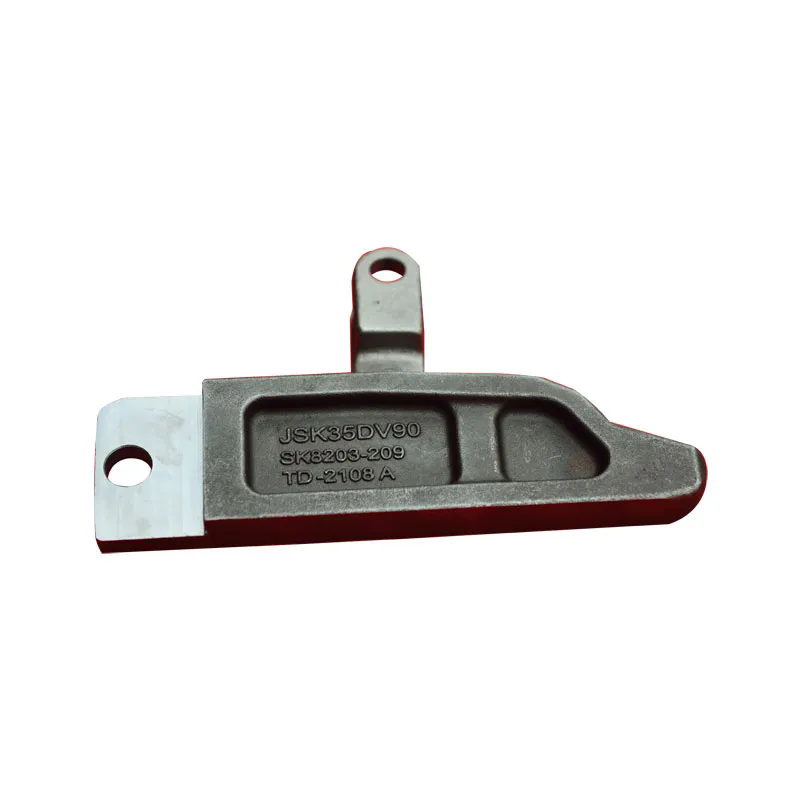Why Are Forgings Essential for Tractor Performance and Durability?
2024-12-11
Tractors are the backbone of modern agriculture and construction, powering a wide range of tasks from plowing fields to hauling heavy loads. One of the key components that contribute to a tractor's performance and durability is the use of forgings. But why exactly are forgings so essential for tractors, and how do they impact their functionality?
1. What Are Forgings in Tractor Manufacturing?
Forging is a manufacturing process in which metal is shaped by applying high-pressure forces. This technique is used to create strong and reliable parts, ensuring that the material's grain structure is aligned in the desired direction for maximum strength. Forged parts for tractors include critical components like axles, crankshafts, gears, and other mechanical parts that undergo heavy stress during operation.
2. How Do Forged Parts Enhance Tractor Performance?
Tractors are subjected to extreme operating conditions, from intense pressure during heavy-duty tasks to constant exposure to harsh outdoor environments. Forged parts help improve performance in the following ways:
- Increased Strength and Durability: Forgings are known for their superior strength compared to cast or machined components. The forging process compresses the metal, making it denser and more resistant to wear and tear. For critical parts like axles and gears, this added strength ensures that tractors can handle demanding workloads without failure.
- Resistance to Fatigue: Tractors work in environments where they must endure constant vibrations, shocks, and mechanical stresses. Forged parts are less likely to fatigue over time, making them a more reliable option for parts that are in constant motion or under high stress.
- Improved Safety: Since forged parts are made from high-quality materials with superior integrity, they reduce the chances of mechanical failure, which could lead to accidents or damage to the tractor. This is especially important for key components such as steering rods or hitch pins, where failure could result in serious consequences.
3. What Types of Tractor Parts Are Forged?
Various parts of a tractor are made through the forging process, each designed to handle specific tasks under heavy-duty conditions:
- Crankshafts: A forged crankshaft is essential for transmitting the engine’s power efficiently. This part must withstand high rotational forces and vibration while maintaining performance over extended periods.
- Axles and Drive Shafts: These components are forged to handle the heavy loads and forces encountered during operations like towing or plowing. The strength of forged axles ensures the tractor can support large equipment without risking failure.
- Gears and Sprockets: Gears are critical for controlling the speed and torque of a tractor. Forged gears offer superior strength and can handle the stresses of various power transmissions.
- Hitch Pins and Connectors: Forged hitch pins ensure secure connections between the tractor and attached implements, such as plows or trailers. Their durability reduces wear over time and ensures that the tractor can effectively tow equipment without risk of disconnection.
- Steering Components: Tractors require precise control, and forged steering components, such as the steering knuckle or linkage, ensure smooth operation even in rough terrains.
4. Why Are Forged Parts More Cost-Effective in the Long Run?
Although forged tractor parts may have a higher initial cost compared to alternatives like cast or stamped parts, they prove to be more cost-effective over time. Here's why:
- Reduced Maintenance Costs: Forged components are more durable, meaning that tractors will require fewer repairs and replacements during their lifespan. This reduces long-term maintenance costs for farmers and tractor owners.
- Higher Performance Longevity: Because forged parts are designed to withstand harsh conditions without failing, they help improve the overall longevity of the tractor. This results in a higher return on investment as the tractor remains operational for a longer period.
- Reduced Downtime: Fewer repairs mean less downtime for the tractor, which is crucial in agricultural and construction environments where time is often of the essence.
5. How Does Forging Contribute to Tractor Design Flexibility?
The forging process offers a great deal of flexibility when it comes to design. Manufacturers can create complex shapes and integrate various features into a single forged part, reducing the need for multiple components. This not only improves the strength and reliability of the tractor but also helps optimize the overall design by reducing weight and improving the balance of the tractor.
6. How Are Forged Tractor Parts Made?
The forging process begins with selecting high-quality raw materials, such as steel or other alloys, which are then heated to a high temperature. The metal is placed into a die or mold and shaped through hammering or pressing to form the desired part. The process results in parts that are both strong and dense, with grain patterns aligned in ways that provide maximum strength in the direction of use.
After forging, the parts undergo finishing processes like machining, heat treatment, or surface coating to ensure they meet the required specifications for size, performance, and resistance to wear.
7. What Are the Advantages of Using Forgings for Tractors?
- Superior Material Integrity: The forging process preserves the integrity of the material by minimizing defects and air pockets that are more common in cast parts. This ensures that tractor parts can withstand heavy loads and resist failure over time.
- Improved Toughness: Forged parts are not only stronger but also more resistant to impact damage. Tractors often operate in harsh, unpredictable environments, and the increased toughness of forged parts ensures they can handle tough conditions like rough terrain and heavy equipment usage.
- Better Performance Under Stress: Forgings are ideal for tractor components that need to perform under constant or extreme stress. Their resistance to stress and strain helps ensure the tractor runs smoothly, even when performing heavy-duty tasks.
Forgings are an essential part of tractor manufacturing, providing significant benefits in terms of performance, durability, and safety. By using forged components, tractor manufacturers can ensure that their machines operate efficiently, withstand challenging conditions, and provide long-lasting value to customers.



